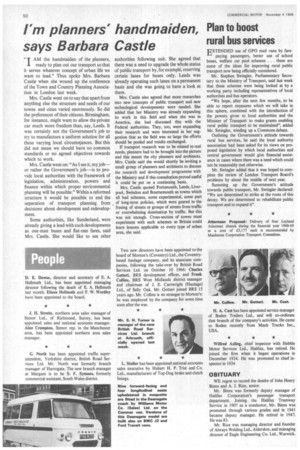I'm planners' handmaiden, says Barbara Castle
Page 52

If you've noticed an error in this article please click here to report it so we can fix it.
"T AM the handmaiden of the planners,
1. ready to plan out our transport so that it serves whatever concept of urban life we want to lead." Thus spoke Mrs. Barbara Castle when she wound up the conference of the Town and Country Planning Association in London last week.
Mrs. Castle went on to say that apart from anything else the structure and needs of our towns and cities varied enormously. So did the preferences of their citizens. Birmingham, for instance, might want to allow the private car much more freedom than, say, Leeds. It was certainly not the Government's job to try to manufacture a uniform solution for all these varying local circumstances. But this did not mean we should have no common standards or no agreed objectives towards which to work.
Mrs. Castle went on: "As I see it, my job— or rather the Government's job—is to provide local authorities with the framework of legislation, administration, powers and finance within which proper environmental planning will be possible." Within a reformed structure it would be possible to end the separation of transport planning from decisions about development and redevelopment.
Some authorities, like Sunderland, were already giving a lead with such developments as one-man buses and flat-rate fares, said Mrs. Castle. She would like to see other authorities following suit. She agreed that there was a need to upgrade the whole status of public transport by, for example, reserving certain lanes for buses only. Leeds was already operating such lanes on a permanent basis and she was going to have a look at them.
Mrs. Castle also agreed that more researches into new concepts of public transport and new technological developments were needed. She added that her Ministry was already expanding its work in this field and when she was in America, she had discussed this with the Federal authorities. They, too, were expanding their research and were interested in her suggestion that as the field was so large the efforts should be pooled and results exchanged.
If transport research was to be related to real needs, planners had to be brought into the picture and this meant the city planners and architects. Mrs. Castle said she would shortly be inviting a small group of planners and architects to discuss the research and development programme with the Ministry and if this consultation proved useful it could be put on a continuing basis.
Mrs. Castle quoted Portsmouth, Leeds, Liverpool, Swindon and Bournemouth as towns which all had schemes, some experimental, some part of long-term policies, which were geared to the freeing of streets or groups of streets from traffic or overwhelming dominatiou by traffic. But this was not enough. Cross-section of towns must experiment with such schemes so Britain could learn lessons applicable to every type of urban area, she said.








































































































































































